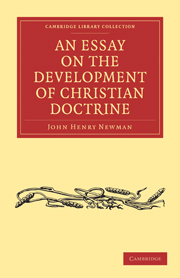Book contents
- Frontmatter
- ADVERTISEMENT
- Contents
- INTRODUCTION
- CHAPTER I ON THE DEVELOPMENT OF IDEAS
- CHAPTER II ON THE DEVELOPMENT OF CHRISTIAN IDEAS, ANTECEDENTLY CONSIDERED
- CHAPTER 3 ON THE NATURE OF THE ARGUMENT IN BEHALF OF THE EXISTING DEVELOPMENTS OF CHRISTIANITY
- CHAPTER IV ILLUSTRATIONS OF THE ARGUMENT IN BEHALF OF THE EXISTING DEVELOPMENTS OF CHRISTIANITY
- CHAPTER V ILLUSTRATIONS CONTINUED
- CHAPTER VI ILLUSTRATIONS CONTINUED
- CHAPTER VII ILLUSTRATIONS CONTINUED
- CHAPTER VIII ILLUSTRATIONS CONCLUDED
- Frontmatter
- ADVERTISEMENT
- Contents
- INTRODUCTION
- CHAPTER I ON THE DEVELOPMENT OF IDEAS
- CHAPTER II ON THE DEVELOPMENT OF CHRISTIAN IDEAS, ANTECEDENTLY CONSIDERED
- CHAPTER 3 ON THE NATURE OF THE ARGUMENT IN BEHALF OF THE EXISTING DEVELOPMENTS OF CHRISTIANITY
- CHAPTER IV ILLUSTRATIONS OF THE ARGUMENT IN BEHALF OF THE EXISTING DEVELOPMENTS OF CHRISTIANITY
- CHAPTER V ILLUSTRATIONS CONTINUED
- CHAPTER VI ILLUSTRATIONS CONTINUED
- CHAPTER VII ILLUSTRATIONS CONTINUED
- CHAPTER VIII ILLUSTRATIONS CONCLUDED
Summary
It is now above eleven years since the writer of the following pages, in one of the early lumbers of the Tracts for the Times, expressed himself thus:–
“Considering the high gifts, and the strong claims of the Church of Rome and its dependencies on our admiration, reverence, love, and gratitude, how could we withstand it, as we do; how could we refrain from being melted into tenderness, and rushing into communion with it, but for the words of Truth itself, which bid us prefer it to the whole world? ‘He that loveth father or mother more than Me, is not worthy of Me.’. How could we learn to be severe, and execute judgment, but for the warning of Moses against even a divinely-gifted teacher who should preach new gods, and the anathema of St. Paul even against Angels and Apostles who should bring in a new doctrine?”
He little thought, when he so wrote, that the time would ever come, when he should feel the obstacle, which he spoke of as lying in the way of communion with the Church of Rome, to be destitute of solid foundation.
The following Work is directed towards its removal.
Having in former Publications directed attention to the supposed difficulty, he considers himself bound to avow his present belief that it is imaginary.
He has neither the ability to put out of hand a finished composition, nor the wish to make a powerful and moving representation, on the great subject of which he treats.
- Type
- Chapter
- Information
- An Essay on the Development of Christian Doctrine , pp. iii - xiiPublisher: Cambridge University PressPrint publication year: 2010First published in: 1845



